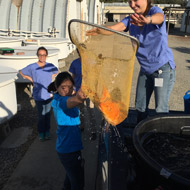
Emergency response team create makeshift transport system
US vets have rescued a number of koi carp from a pond that had to be abandoned in the Californian wildfires.
UC Davis Veterinary Emergency Response Team (VERT), were performing search and rescue operations in Sonoma County when they came across the privately owned pond. The pond was contaminated with ash and lacking oxygen due to power loss in the area.
Following advice received from fish specialist Dr Esteban Soto, and VERT member Dr Eric Davis, the team secured a horse water trough in the back of a pickup truck and carefully raked the pond to remove the fish.
Worried about the lack of oxygen and a long trek back to campus, the team employed the use of a tire pump air compressor. Running a cord through the back window, they plugged the compressor into the truck’s power ports.
They placed a tube from the compressor into the water to provide airflow and placed plywood over the top of the trough to stop the fish and water spilling over. Once back at the UC Davis Centre for Aquatic Biology, the fish were placed into large tanks with plenty of oxygen and food.
But the drama didn’t end there. Back in the fire region, word got out that UC Davis was able to rescue koi and other owners asked VERT to visit their properties to help their fish. The next day, VERT rescued six more koi and, on the third day, 14 fish.
Once back at the campus, the fish were examined by Dr Soto who regularly treats koi as part of UC Davis Veterinary Hospital’s Aquatic Animal Health Unit. Over the next few weeks, the fish will be allowed to acclimatise and vets will perform a physical examination under anaesthesia.
The exam includes collection and analysis of gill clips and skin scrapes, as well as blood collection and analysis. If needed, the koi will be treated and monitored until they are ready to go home.
Dr John Madigan, director of VERT commented: “When all this started, who would’ve thought that the largest group of animals we treated from the fires would have been fish.”
Image (C) The University of California, Davis.



 The veterinary mental health charity Vetlife is inviting the veterinary community to join it for a sponsored cold-water dip.
The veterinary mental health charity Vetlife is inviting the veterinary community to join it for a sponsored cold-water dip.